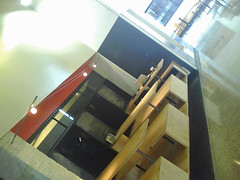Washington, D.C.
I got back a little late from today's lunch, and missed most of the first couple of papers in the next session here at Creativity & Cognition 2007. The paper by Kirsty Beilharz and Sam Ferguson is already in progress; they enhanced a Japanese flute, the shakahachi, with a variety of extra-instrumental sensors which drive a generative music system, creating a hyper-instrument, or a creative environment for the instrument. The environment senses the player's physical gestures while plying the instrument; some such gestures already exist as part of the normal process of playing the shakahachi, and the environment therefore enhances and builds on the often unconscious movements of the player, enabling them to exploit techniques they already have. Additionally, qualities of the instrument tone itself (breathiness, noisiness, and other qualities) are also monitored and harnessed.














